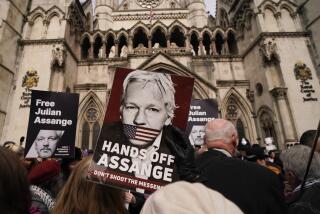Pakistani officials won’t rule on American’s diplomatic immunity
Pakistani authorities Monday balked at ruling on whether CIA contractor Raymond Davis is immune from prosecution in a double murder case and instead put the matter in the hands of a Lahore trial court, a decision that will probably prolong the diplomatic crisis between the U.S. and Pakistan.
The Lahore High Court had earlier ordered the federal government to clearly state on Monday its position on whether Davis, a 36-year-old American, has diplomatic immunity that would shield him from being tried for the Jan. 27 shooting deaths of two Pakistani motorcyclists who he says were trying to rob him in Lahore. The U.S. government insists Davis has that immunity and should be immediately released from a Pakistani jail.
However, the Pakistani Foreign Ministry told Lahore Chief Justice Ijaz Chaudhry that the question of Davis’ immunity needs to be decided by the trial court handling the murder case. Without a clear position from the Pakistani government, the high court did not issue its own ruling and instead sent the matter to the trial court.
Monday’s developments left unresolved a case that has severely strained relations between the U.S. and Pakistan, an ally Washington relies on heavily in the battle against Taliban and Al Qaeda militants in the country’s volatile northwest, as well as in efforts to bring an end to the insurgency in Afghanistan.
The U.S. has repeatedly pressed Pakistani officials to release Davis on the grounds that he enjoys the immunity from criminal prosecution given to all diplomats through the Vienna Convention of 1961.
Washington has argued that Davis’ immunity was triggered by the U.S. government’s notification to the Pakistani government in January 2010 that he was a diplomat being assigned to the U.S. Embassy in Islamabad. Once that notification was made, the only action Pakistan could have taken against Davis was to declare him persona non grata and kick him out of the country, according to U.S. officials.
However, fearing a backlash from a Pakistani public that has grown increasingly anti-American in recent years, the Pakistani government has been reluctant to unequivocally say whether Davis has immunity. Most Pakistanis want Davis tried on the murder charges, a feeling that intensified with the recent revelation that he had been working as a contractor for the CIA.
Davis says he was in his car at a busy intersection when two men on a motorcycle approached, one of them brandishing a handgun. Davis says he fired at both men in self-defense. However, police say the shooting was unjustified, pointing out that both men had bullet wounds in their backs.
Another U.S. government vehicle rushing to Davis’ aid struck and killed a third Pakistani motorcyclist. Pakistani authorities believe the driver of that car has since returned to the U.S.
One potential resolution to the case would involve the use of an Islamic tradition embraced by Pakistani law that allows the heirs of a murder victim to accept financial compensation, known as diyat, in exchange for forgiving the killer. The families of the two men Davis shot have not said whether they would abide by such a resolution, and the U.S. has refused to say whether they have initiated talks focused on an out-of-court settlement.
A Lahore trial court hearing the murder case will convene again Wednesday.
More to Read
Start your day right
Sign up for Essential California for news, features and recommendations from the L.A. Times and beyond in your inbox six days a week.
You may occasionally receive promotional content from the Los Angeles Times.






